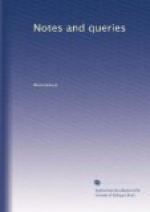“These verses are not
the production of Pope, as might indeed readily
have been perceived, but of
Aaron Hill.”
I must confess I cannot agree with the remark. If the point be to be decided by internal evidence, the verses are surely Pope’s. The collection of A. Hill’s miscellaneous works was a posthumous one for the benefit of the family, and includes several other poems, which were certainly not written by him. Little stress, therefore, can be laid upon the fact of the lines being included in this collection, which seems to have comprised whatever was found amongst Hill’s papers, without any nice examination or scrutiny. My conclusion is, that the verses are Pope’s; and it is at all events certain that they are not Charles Yorke’s.
JAMES CROSSLEY.
Archbishop Bolton of Cashel (Vol. iii., p. 39.).—He was born at Burrishool, in the county of Mayo, about 1678; graduated at Trinity College, Dublin; was ordained deacon in 1702; priest in 1703; became a prebendary of St. Patrick’s, Dublin, in 1707; chancellor of that cathedral in 1714; vicar-general of the diocese of Dublin in 1720; vicar of Finglas, near Dublin, in the same year; praecentor of Christ Church, Dublin, in 1722; bishop of Clonfert in the same year; bishop of Elphin in 1724; archbishop of Cashel in 1729; to which diocese he bequeathed his valuable library.
He died in January, 1744, and was buried at St. Werburgh’s Church, in Dublin.
{73} See my Fasti Ecclesiae Hibernicae, vols. i., ii., and iv., for a few more particulars, if required.
H. COTTON.
Thurles, Ireland, Jan. 20. 1851.
Erasmus and Farel (Vol. iii., p. 38.).—In my Life of Calvin, p. 46., I mention that Erasmus named Farel, Phallicus; and infer that he probably did so from some manifestation of amorous propensities on the part of that reformer.
A querist in your last number (J.C.R.) points out that D’Aubigne, or his translator, spells the word Fallicus, and refers it to the deceitful character of Farel.
Phallicus is a Greek word, and has a meaning—[Greek: phallikos], of or belonging to the [Greek: phallos]. Fallicus, to the best of my knowledge, is neither Greek nor Latin, and has no meaning. Erasmus, in his epistles, constantly spells the word Phallicus. (See Epp. 698. 707. &c. Leyden, ed. 1706.) And that I was justified in drawing from it an inference which is in analogy with its meaning, the following passages, in the last of the epistles just cited, will establish:—
“Hunc stomachum in me
concepit (Phallicus) quod in spongia dubitem
de
Lutheri spiritu: praeterea
quod scripserim, quosdam sordidos, et impurae
vitae se jactitare nomine
Evangelii.”
And a little farther on—
“At tamen quicquid hactenus
in me blateravit Phallicus, non minus vane
quam virulente, facite condonabitur
hominis morbo, modo posthac sumat
mores Evangelii praecone
dignos.”




